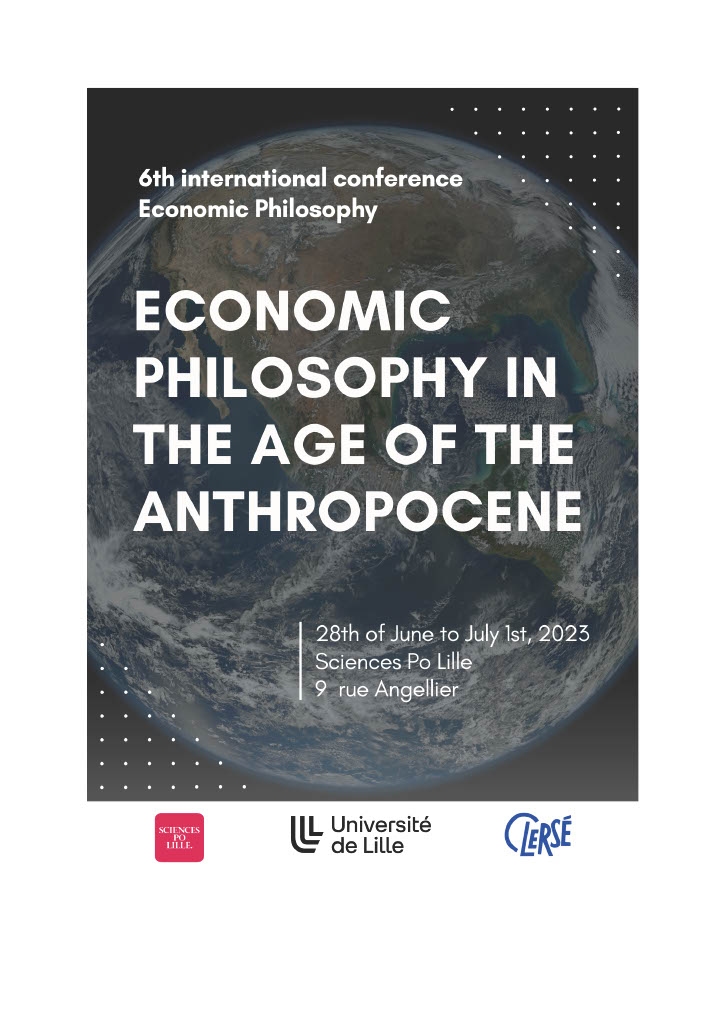
6th. International Conference Economic Philosophy
Economic Philosophy in the Age of the Anthropocene
Sciences Po Lille (France), June 28–July1st,2023
The 6th International Conference “Economic Philosophy” will be held at Sciences Po Lille from the 29th of June
to July 1st, 2023. The conference isorganized by Sciences Po Lille, the University of Lille and CLERSE (UMR
8019).
We invite economists and philosophers and researchers from all academic fields to send proposals on different
aspects of the Anthropocene in relation with economics, economic philosophy and economic thought. An abstract
of about 500 words for a paper and 600 words for a session should be submitted on the conference website no
later than 20 January 2023. Decisions will be notified by 13 March 2023.
The conference will be preceded by a young scholars’ seminar held at the same place the 28th of June 2023.
Persons currently enrolled in a PhD, or who have been awarded a PhD two years or less prior to the conference
are invited to submit their work.
All our economic activities are transforming ecosystems and threatening the natural habitats that support allforms of life. This is what is known as the Anthropocene. Its advent corresponds with the beginnings of capitalism and with the industrial revolution, justifying for some the neologism of the “capitalocene”. The destruction of our commons-the climates, environments and species of earth-seems irreversible, threatening life on earth. Humanity becomes the subject of this event, regardless of cultural or national affiliation and we do not have the institutions to deal with this historically unparalleled challenge, nor do we know which scientific discipline is able to tackle it. The main currents in economic science all try to answer with their devices for measuring the good,its growth, its distribution and its use. Are they equipped to measure and remedy the destruction of our common goods?
The different branches of economics are not in capacity to provide a universal measure, able to go beyond the political divisions of nation states, beyond the production, distribution and consumption of wealth.Humanity, understood as the economic agent of the Anthropocene,does not know how to act; it is paralyzed andasconsequence we do not know what to do or how to act. Economics is in trouble and seems helpless and silent. This crisis therefore is not only an economic crisis, nor just a crisis of humanity or a crisis of meaning, it is also and above all a moral, intellectual and scientific crisis. In other words, it is a crisis of the spirit that animated Modernity, a spirit present in contested claims of economics to provide the measuring instruments to guide individual and collective action. Economic philosophy is called upon, but can it still instruct and guide usin the face of the challenges of the
Anthropocene?
Part of the economics profession continues tobelieve that this science has the means to respond to these challenges, that it has the tools and the method to construct and propose new indicators to guide collective choices. It calls upon the legislators of all countries in the hope that they will unite in a common program of ecological and economic transition, without calling into question the spirit economic theory, of capitalism and of Modern Times in general. But isn't this political economy, which sees the legislator as the privileged economic subject, exhausted? Can it include the common good in its measuring devices? Are money and the centralized banking system still relevant institutions in the face of emergency ? Is the Anthropocene not a symptom indicating the loss of the economic sovereignty of states? Etc.
The question of a other economy raises out of these questions. The economy has not always had the globalized capitalist form that we know today. In the past, other economies existed that did not constitute a monetary system of productionand exchange under the authority of Leviathan. Hence the following questions, which constitute avenues for reflection for this conference:
- Are we witnessing the return of a non-political economy, an ethical economy of use?
- Is a local economy that is more concerned with the environment the answer to
- contemporary challenges?
- Is it a return to primitive, domestic or community-based economic forms of the past?
- Does the current crisis give meaning to what is happening to us: the gift of a common humanity that obliges us to serve others and our fellow human beings?
Finally, in the urgency of the present situation, reflections on types of ecological rationality, environmental injustice,the commons and thecommon,ecological transition and democratic deliberation, and all other philosophical and economic contributions from
thinkers who have contributed to this field of research will bewelcome.



